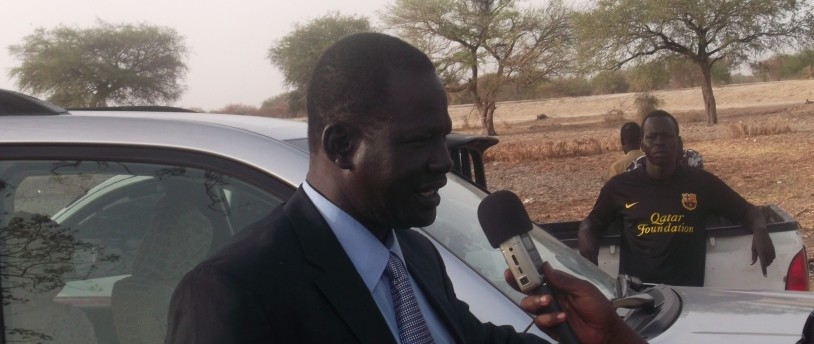The late Ngok Dinka paramount chief in several recent interviews with Radio Tamazuj spoke openly about the challenges Abyei faces, and his vision for peace and brotherly co-existence between Dinka and Misseriya in the region. This selection of highlights is the first time that any of these interviews appear in print.
In December last year, Kuol Deng Kuol warned the world to not underestimate the critical state of affairs in Abyei: “I do not understand how people can say the region is stable and that there is no more insecurity in Abyei.”
In the same interview he blamed the Misseriya for “destruction, killing and raiding” in Abyei and added that “when you ask the Misseriya why are they committing crimes, they will say it is not them but the Sudanese government who are to be blamed. The Sudanese government will then say the same thing and blame Misseriya militias for looting the area.”
Kuol Deng Kuol was killed Saturday in Abyei by gunmen belonging to the neighboring Missiriya Arab tribe.
The chief was traveling with other members of the Abyei Joint Oversight Committee (AJOC) under escort by a convoy of the UN Interim Security Force for Abyei (UNISFA), the Ethiopian peacekeeping force in Abyei. One Ethiopian peacekeeper, a companion of Kuol and 17 Misseriya fighters were killed in the incident, according to a statement issued by the Sudanese Foreign Ministry.
In another interview in February this year, Kuol was critical on the track record and role of UNISFA: “It is the only authorized force to be in Abyei… so they are supposed to handle all security issues. They were given the power to deal with any criminal trying to violate agreements and cause instability in the region.”
According to Kuol, the Ethiopian peacekeeping force “seemed restricted and acted as if they do not have a right to exploit that privilege.” The chief suggested that the rule of law in the region was tenuous and the peace fragile.
Kuol believed, however, that history proved Ngok Dinka and Misseriya were able to live in peace as neighbors. In February, he expressed his hope “there will be a great peaceful co-existence between Misseriya and Dinka communities in the future. This will only come about when Ngok Dinka and Misseriya engage in a dialogue without insulting and provoking each other.”
He also continued to uphold the legitimacy of the ruling of the Permanent Court of Arbitration in The Hague, which in 2009 redefined the size of the region and left the way open for a referendum on whether Abyei should separate from Sudan together with the rest of the south.
Road to lawlessness
Remarks from the chief below are excerpted from an interview in February:
“I think according to my own opinion UNISFA didn’t carry out its obligations as the citizens were expecting and if there are some hidden things it would have been better for them to let us know. But as we know, the UNISFA is the only authorized forces to be in Abyei without presence of additional forces from South Sudan or Sudan so they are supposed to handle the whole security issues and they are supposed to implement the UN Article 7 which granted them powers to deal with any criminal trying to violate the agreements and cause instability to the region. But it seems like they are restricted and have no right to exploit that privilege. They are just depending on the citizens’ respect of the laws, and if there are those who undermine the laws then the way is open for them just like what has happened to Dinka Ngok community recently by the Misseriya.”
“In the future to come if Sudan backs down from its demand that Abyei belongs to them as was ruled by the international court, again if the Khartoum government admitted that Abyei area is a Dinka Ngok land and it was annexed to Sudan in 1905 administratively, then I think there will be a great peaceful co-existence between Misseriya and Dinka community as neighbours. In addition to that if they allowed the region’s referendum to be carried out in accordance with the suggested African Union road map and implemented it I think everything will be fine because the relationship between the two communities is dated back before many years and they were living peacefully as they were not claiming Abyei.
“But that brotherly co-existence is now distorted due to the rampant raid, killing and destructions carried out by the Misseriya elements in addition to their claim over Abyei.
‘Destruction due to greed’
“My message through Radio Tamazuj is that we are hoping and urging the two countries, the African mediators and the international community who are now meeting in Addis Ababa that this should be the last meeting in order for us to implement the already agreed-upon agreements in order to put an end to the civil war in Abyei and leave the normal citizen to live in peace and stability as well as to restart their lives from the beginning from the huge destruction which the region witnessed due to greediness only.
“This is what we are expecting to be the outcome of this conference (in Addis Ababa), otherwise the the opposite will true — because either the agreement is implemented and the (AU) suggestions have to be accepted in order to put an end to prolonged war in Abyei, or people have to go back to jungle law, as Sudan is expecting it can take everything from South Sudan by force and can reunite South Sudan with Sudan again as before.”




